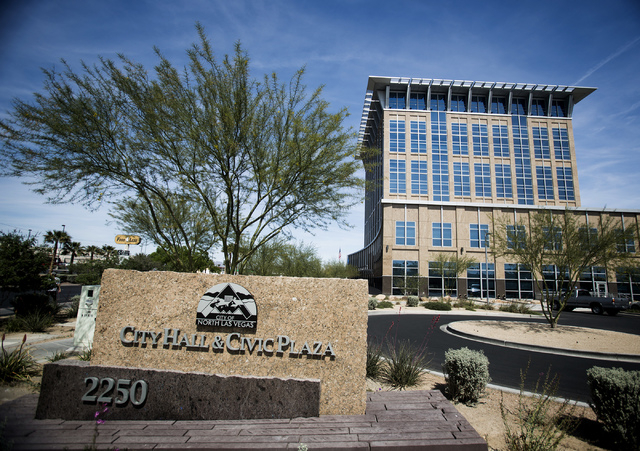Changes likely slow for state law that affects North Las Vegas finances
State officials agree there ought to be a law to help ensure North Las Vegas’ fiscal future, but it could be a while before they settle on what it should look like.
Nevada’s Committee on Local Government Finance, made of state and local government financial experts, didn’t get very far Friday in its first attempt to tackle the issue.
Deputy state tax director Terry Rubald — tasked in March with drafting changes to the state’s severe financial emergency statute — told committee members she has already come up with several potential changes to the law. But she wasn’t quite ready to summarize those tweaks at this week’s meeting.
Rubald promised to have a bill draft request ready for the committee’s approval by August. She declined to offer details on the content of the proposal.
That didn’t leave committee members much to talk about after.
Reached for comment before Friday’s meeting, committee chair Marvin Leavitt came up with a pair of possible legislative fixes that might help North Las Vegas get on top of a projected seven-year, $152.6 million budget deficit.
One would see state legislators lift oft-criticized caps on local government commercial and residential property tax collections, which could allow for larger tax increases.
The other would see them revise receivership — Nevada’s broadly untested statutory alternative to bankruptcy.
Both aim to grab the attention of North Las Vegas’ creditors, holders of an estimated $430 million in outstanding city debt obligations.
“The only way that bondholders are going to want to renegotiate is if they don’t think they’ll get their money back,” Leavitt said Thursday. “Anything that would lead them to that conclusion might lead them to renegotiate.”
Under receivership, a team of state-appointed financial experts would have the power to increase North Las Vegas’ property taxes and negotiate future, but not existing, union contracts.
Leavitt, who helped draft Nevada’s receivership statute, said the severe financial emergency law works great for small municipalities and financially troubled school districts but was never intended to help bail out larger cities.
Replacing it with something that looks more like state-sanctioned municipal bankruptcy would, he said, undoubtedly bring bondholders to the bargaining table.
It could also lead to lots of unintended consequences.
“I personally have some fears about bankruptcy,” Leavitt said. “When you issue debt, and there’s the possibility that you might go bankrupt, that risk is factored into interest rates.
“That concerns me because it would have applications way beyond North Las Vegas.”
Mesirow Financial Managing Director Peter Bianchini, one of North Las Vegas’ hundreds of institutional debt holders, sided with Leavitt’s second suggestion for bringing bondholders into the fold: property tax cap reform.
Bianchini agreed that lifting, or even just loosening, existing caps on locally collected property tax revenue could have a near-immediate impact on the city’s bottom line.
If bondholders knew North Las Vegas had a little more leeway to grow its tax base, he doesn’t doubt officials would be able to restructure the city’s debt payment plan.
“The concept makes sense,” Bianchini said. “If revenues aren’t going to grow, bondholders aren’t going to buy it. But if the tax base grows, they might.
“A move toward statutory bankruptcy would not be good for us. We would want to monitor that very closely.”
It’s hard to say which way North Las Vegas leaders are leaning on proposed fixes to the state’s receivership law.
A tentative balanced budget submitted to the state tax department earlier this month highlights some $214,000 set aside for city lobbying efforts during the next legislative session, though leaders have declined to comment on where they’ll direct those dollars.
Assembly Speaker Marilyn Kirkpatrick, who has said Nevada’s state receivership law “could use a little clarity,” could not be reached for comment Friday.
Kirkpatrick has previously declined to talk about the possibility of drafting a state-sanctioned bankruptcy law. She has come out against wholesale reform of the existing property tax cap formula.
Local government finance committee members will look to revisit potential receivership statute fixes at a meeting tentatively scheduled in mid-August.
Contact James DeHaven at jdehaven@reviewjournal.com or 702-477-3839. Find him on Twitter @JamesDeHaven.

















